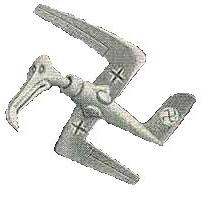
April 11
1814 Napoleon exiled to Elba:
On this day in 1814, Napoleon Bonaparte, emperor of France and one of the greatest military leaders in history, abdicates the throne, and, in the Treaty of Fontainebleau, is banished to the Mediterranean island of Elba. [For further details, Click here.]
1866 Birth: Charles Benedict Davenport: American zoologist who contributed substantially to the study of eugenics (the improvement of populations through breeding) and heredity and who pioneered the use of statistical techniques in biological research. Partly as a result of breeding experiments with chickens and canaries, he was one of the first, soon after 1902, to recognize the validity of the newly discovered Mendelian theory of heredity. In Heredity in Relation to Eugenics (1911), he compiled evidence concerning the inheritance of human traits, on the basis of which he argued that the application of genetic principles would improve the human race. These data were at the heart of his lifelong promotion of eugenics, though he muddled science with social philosophy.
1890 Birth: Donna Rachele Mussolini:
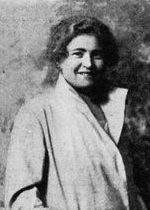
Wife of Italian dictator, Benito Mussolini. She came from a peasant family and moved in with Benito Mussolini in 1910. They married in 1915 in a civil ceremony and renewed their vows in a religious service in 1925 (after Benito's rise to power). She bore five children by her husband, and was willing to ignore his various mistresses. She was portrayed as the model Fascist housewife and mother. She remained loyal to Mussolini until the end, and was arrested in 1945 by Italian Partisans in Switzerland (she fled Italy after World War II) and was turned over to the Americans as a harmless matron and was released after several months. In her later life she ran a restaurant and received a Government pension until her death. After her husband's death she begged to have his body for private burial.
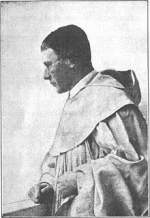
1899 Volkishness: Father Georg (Adolf Josef Lanz) writes a letter to the authorities of Heiligenkreuz Abbey, complaining of his desire for physical and intellectual freedom. Note: Adolf Josef Lanz is a Defrocked Cistercian monk, conman (doctor, baron) and race-fanatic whose writings will have a great influence on both Hitler and Eckart. In 1900, Lanz will found an antisemitic lodge known as the 'Order of the New Temple' (ONT) and set himself up as grandmaster. Its symbol, chosen by Lanz himself, will be the Swastika. Lanz's magazine Ostara will become extremely popular for a time in Vienna and throughout the German speaking world. Lanz and Hitler will meet in Vienna sometime in 1908-1909 (possibly earlier when Lanz visits Lambach in late 1890's). Several books by Lanz will be found in Hitler's library when it is seized by the Allies at the end of the war.
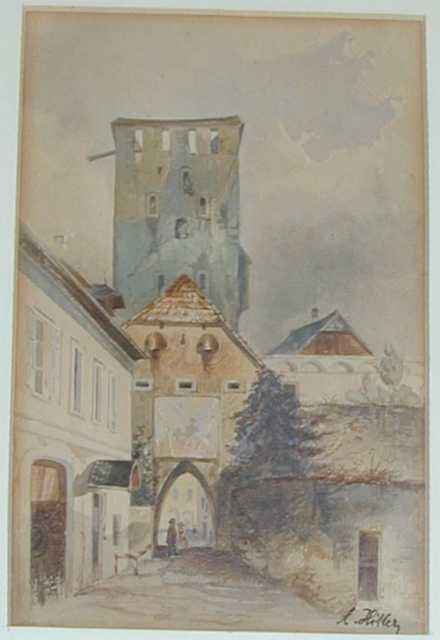
1910 Starving artist Adolf Hitler receives a commission from upholsterer Karl Pichle, who operates a shop at 30 Hernalser Haupstrasse in the Hermals district of Vienna. He is paid to paint a spring and fall landscape, and is soon painting full time. He receives commissions from a glazier, Samuel Morgenstein, and proceeds to create many pieces a little more ambitious than the postcard-size works he initially produced. He soon discovers an additional market for watercolors: to be used by picture frame manufacturers, to display their finished frames. On average, he receives only 3 - 5 kronen per painting. The daughter of one of these frame manufacturers, Jakob Altenberg, would later complain that Hitlerís paintings were of poor quality: "These were the cheapest items we ever sold. The only ones who showed any interest in them were tourists, looking for inexpensive souvenirs." [See: Did Hitler's Rejection From Art School Make Him Anti-Semitic?]
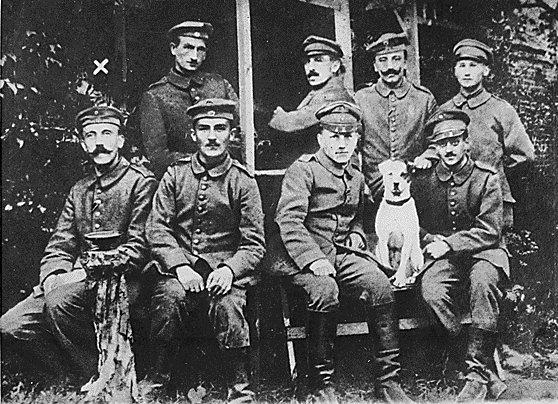
1916 World War I: Gefreiter Adolf Hitler endures trench warfare in Flanders (Artois) with 3 Company, 16 Reserve Infantry Regiment [List Regiment]. [For further details, Click here.]
1917 World War I: List Regiment: Gefreiter Adolf Hitler's 16 Reserve Infantry Regiment, 3 Company, fortify trenches near Arras. [For further details, Click here.]
1918 World War I: Sir Douglas Haig's "Backs to the Wall" Order:
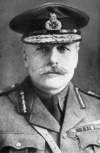
Three weeks ago to-day the enemy began his terrific attacks against us on a fifty-mile front. His objects are to separate us from the French, to take the Channel Ports and destroy the British Army. In spite of throwing already 106 Divisions into the battle and enduring the most reckless sacrifice of human life, he has as yet made little progress towards his goals. We owe this to the determined fighting and self-sacrifice of our troops. Words fail me to express the admiration which I feel for the splendid resistance offered by all ranks of our Army under the most trying circumstances. Many amongst us now are tired. To those I would say that Victory will belong to the side which holds out the longest. The French Army is moving rapidly and in great force to our support. There is no other course open to us but to fight it out. Every position must be held to the last man: there must be no retirement. With our backs to the wall and believing in the justice of our cause each one of us must fight on to the end. The safety of our homes and the Freedom of mankind alike depend upon the conduct of each one of us at this critical moment.
1918 World War I: List Regiment: Gefreiter Adolf Hitler's 16th RIR constructs fortified works in difficult defensive positions on an active front with German assault regiments near Fountaine (Montdidier). [For further details, Click here.]
1919 International Labor Organization founded: On this day in 1919, in Paris, France, the International Labor Organization (ILO) is founded as an independent, affiliated agency of the League of Nations. [For further details, Click here.]
1933 Various:
Dachau: Administration of the concentration camp is taken over by the SS.
Resistance: 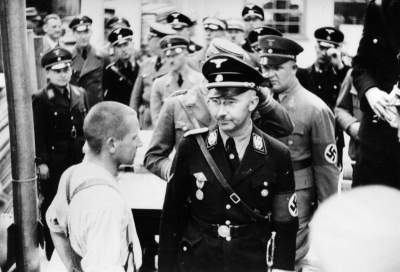

Church and Reich: Dr. Edith Stein, a Jewish convert to Catholicism and later known as Sister Teresia Benedicta a Cruce of the Order of the Carmelites, communicates with Pope Pius XI from Germany, expressing grave concerns about the Nazis' anti-Semitic aims and requesting that the Pontif to issue an encyclical on the Jewish question. Dr. Stein's request will not be granted. (THP)
1935 Stresa:The prime ministers of Britain, France and Italy meet at Stresa, Italy, to discuss Austrian independence and discuss establishing a common front against its unification with Germany.
1937 Holocaust: A new order from the German Ministry of the Interior deprives all Jews of municipal citizenship. (THP)
1938 Bulgaria outlaws the Bulgarian Nazi Party (Ratnizi).
1939 Various: Operation White: Adolf Hitler issues a directive for a proposed plan to attack Poland:
Earlier that spring, having played his winning Czechoslovakian card, Hitler turned his attention toward Poland. Undeterred by Britain's promise to defend Polish borders, which was affirmed on March 31, Hitler issued important orders on April 11: The Wehrmacht should prepare Operation White (Fall Weiss), the code name for Nazi Germany's forthcoming attack on Poland. Before that attack could be launched, the Germans needed to check potential opposition from the Soviet Union. [For further details, Click here.]
League of Nations: Hungary withdraws from the league.
1940 World War II: Memorandum by the German Ambassador in the Soviet Union (Schulenburg):
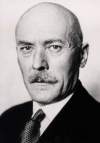
For some time we have observed in the Soviet Government a distinct shift which was unfavorable to us. In all fields we suddenly came up against obstacles which were, in many cases, completely unnecessary; even in little things like visas they started to create difficulties; the release of the Volksdeutsche imprisoned by the Poles, which was promised by treaty, could not be achieved; the deportation of the German citizens long imprisoned in Soviet jails suddenly stopped; the Soviet Government suddenly withdrew its promises already given with regard to the "North Base" ["Basis Nord"] in which our Navy is interested, etc. These obstacles, which were apparent everywhere, reached their climax in the suspension of petroleum and grain shipments to us. On the 5th of this month I had a long talk with Herr Mikoyan, during which the attitude of the People's Commissar was very negative. I had to make the most strenuous efforts to get at least some concessions from him. We asked ourselves in vain what the reason might be for the sudden change of attitude of the Soviet authorities. After all, nothing at all had "happened"! I suspect that the tremendous clamor of our enemies and their sharp attacks on neutrals-particularly on the Soviet Union-and on neutrality in general were not without effect upon the Soviet Government, so that it feared being forced by the Entente into a great war for which it is not prepared, and that for this reason it wanted to avoid anything that might have furnished a pretext to the English and French for reproaching the Soviet Union with unneutral behavior or partisanship for Germany. It appeared to me as though the sudden termination of the Finnish war had come about from similar considerations. Of course, these suspicions could not be proved. However the situation had become so critical that I decided to call on Herr Molotov in order to talk these matters over with him, and after this discussion to notify the Foreign Office. On the 8th of this month I therefore asked for permission to see Herr Molotov—i.e., before the Scandinavian events. Actually, the visit to Herr Molotov did not take place until the morning of the 9th—i.e., after our Scandinavian operations. During this talk it became apparent that the Soviet Government had again made a complete about-face. Suddenly the suspension of the petroleum and grain shipments was termed "excessive zeal of subordinate agencies" which would be immediately remedied. (Herr Mikoyan is Assistant Chairman of the Council of People's Commissars, i.e., the highest Soviet personality after Herr Molotov!) Herr Molotov was affability itself, willingly received all our complaints and promised relief. Of his own accord he touched upon a number of issues of interest to us and announced their settlement in a positive sense. I must honestly say that I was completely amazed at the change. In my opinion there is only one explanation for this about-face: our Scandinavian operations must have relieved the Soviet Government enormously-removed a great burden of anxiety, so to speak. What their apprehension consisted of, can again not be determined with certainty. I suspect the following: The Soviet Government is always extraordinarily well informed. If the English and French intended to occupy Norway and Sweden it may be assumed with certainty that the Soviet Government knew of these plans and was apparently terrified by them. The Soviet Government saw the English and French appearing on the shores of the Baltic Sea, and they saw the Finnish question reopened, as Lord Halifax had announced; finally they dreaded most of all the danger of becoming involved in a war with two Great Powers. Apparently this fear was relieved by us. Only in this way can the completely changed attitude of Herr Molotov be understood. Today's long and conspicuous article in Izvestia on our Scandinavian campaign (already sent to you by wire) sounds like one big sigh of relief. But, at any rate-at least at the moment-"everything is in order" again here, and our affairs are going as they should.
1941 World War II: Various:
Rommel's siege of Tobruk begins:
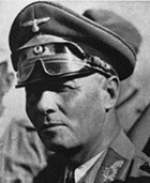
Rommel's offensive forced British and its allies to retreat to the safety of static defenses around Tobruk. Rommel's first attempt to break the Tobruk's defenses made on April 11th lasted until April 13th but failed. It was followed by a second unsuccessful attempt on April 30 that lasted until May 2nd of 1941. At that time, Erwin Rommel was nicknamed the Desert Fox by both his friends and enemies, because he constantly improvised and used tricks in order to outsmart his enemies. [For further details, Click here.]
War in the Air: Germany blitzes Coventry, England. [See: Why Did Hitler Lose The Battle of Britain?]
Hungarian occupation of Yugoslav territories:
Hungary occupied and annexed territories during World War II that it had lost to Yugoslavia in the Treaty of Trianon after World War I. On 11 April 1941, 80,000 Hungarian troops crossed the Yugoslav border to join the German-led Axis invasion. Despite only sporadic resistance, Hungarian troops killed many civilians during the invasion. The Hungarian authorities deported tens of thousands of Serbs from the territories, re-settling Hungarians from other parts of Hungary. Resistance to the occupation began in the latter half of 1941, and in January 1942 the Hungarian military conducted retaliatory raids that killed over 3,300 people, mostly Serbs and Jews. In March 1944, when Hungary began to negotiate with the Allies, Germany invaded and took control of Hungary, including the annexed territories. The remaining Jews were collected and transported to extermination camps, where 85 per cent of those from the occupied territories died. The territories were restored to Yugoslav control as the Germans were pushed out of the region in late 1944 and 1945. [For further information, click here.]
1942 World War II: War at Sea:The Distinguished Service Medal for Merchant Marines is authorized.
1945 World War II: Various:
The U.S. army liberates Buchenwald concentration camp: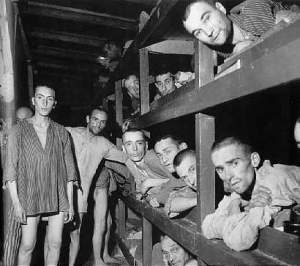
On this day in 1945, the American Third Army liberates the Buchenwald concentration camp, near Weimar, Germany, a camp that will be judged second only to Auschwitz in the horrors it imposed on its prisoners.
As American forces closed in on the Nazi concentration camp at Buchenwald, Gestapo headquarters at Weimar telephoned the camp administration to announce that it was sending explosives to blow up any evidence of the camp—including its inmates. What the Gestapo did not know was that the camp administrators had already fled in fear of the Allies. A prisoner answered the phone and informed headquarters that explosives would not be needed, as the camp had already been blown up, which, of course, was not true.
The camp held thousands of prisoners, mostly slave laborers. There were no gas chambers, but hundreds, sometimes thousands, died monthly from disease, malnutrition, beatings, and executions. Doctors performed medical experiments on inmates, testing the effects of viral infections and vaccines.
Among the camp's most gruesome characters was Ilse Koch, wife of the camp commandant, who was infamous for her sadism. She often beat prisoners with a riding crop, and collected lampshades, book covers, and gloves made from the skin of camp victims.
Among those saved by the Americans was Elie Wiesel, who would go on to win the Nobel Peace Prize in 1986.
From a speech by Grand Admiral Karl Doenitz:
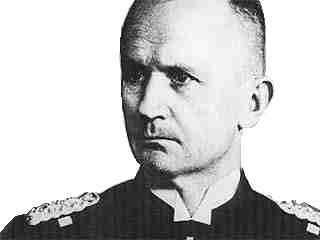
Only the Fuehrer has for years realized with what danger Bolshevism threatens Europe. Perhaps even this year, Europe will realize that Adolf Hitler is the only statesman of stature in Europe. Europe's blindness will one day come to a sudden end and thereby bring Germany's psychological help and political possibilities arising therefrom. [See: The Last Days of the Third Reich.]
From Doenitz's IMT Testimony:In the spring of 1945 I was not head of the State; I was a soldier. To continue the fight or not to continue the fight was a political decision. The head of the State wanted to continue the fight. I as a soldier had to obey. It is an impossibility that in a state one soldier should declare, "I shall continue to fight," while another declares, "I shall not continue the fight." I could not have given any other advice, the way I saw things; and for the following reasons: First: In the East the collapse of our front at one point meant the extermination of the people living behind that front. We knew that because of practical experiences and because of all the reports which we had about this. It was the belief of all the people that the soldier in the East had to do his military duty in these hard months of the war, these last hard months of the war. This was especially important because otherwise German women and children would have perished. The Navy was involved to a considerable extent in the East. It had about 100,000 men on land, and the entire surface craft were concentrated in the Baltic for the transport of troops, weapons, wounded, and above all, refugees. Therefore the very existence of the German people in this last hard period depended above all on the soldiers carrying on tenaciously to the end.
Secondly: If we had capitulated in the first few months of the spring or in the winter of 1945, then from everything we knew about the enemy's intentions the country would, according to the Yalta Agreement, have been ruinously torn asunder and partitioned and the German land occupied in the same way as it is today. Thirdly: Capitulation means that the army, the soldiers, stay where they are and become prisoners. That means that if we had capitulated in January or February 1945, 2 million soldiers in the East, for example, would have fallen into the hands of the Russians. That these millions could not possibly have been cared for during the cold winter is obvious; and we would have lost men on a very large scale, for even at the time of the capitulation in May 1945-that is, in the late spring-it was not possible in the West to take care of the large masses of prisoners according to the Geneva Convention. Then, as I have already said, since the Yalta Agreement would have been put into effect, we would have lost in the East a much larger number of people who had not yet fled from there. [See: Why Did Hitler Insist on No Surrender?]
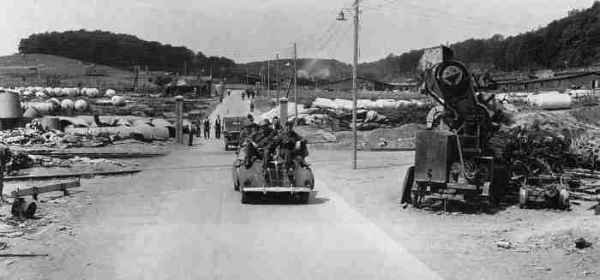
From the US 3rd Armored Division War Diary:
Nordhausen was entered on 11 April by Combat Command "B." The enemy offered little opposition in the town itself. Perhaps they feared being connected, in some way, with the notorious Nordhausen concentration Camp, near the city. This camp was uncovered in all its depravity by the 3rd Armored Division, and steps were taken to insure that photographic and other evidence was collected before any changes were made. Even the great piles of starved dead were left as found.
Division medical personnel quickly removed the hundreds of starvation cases to emergency hospitals where they could be cared for. Many of the less severe cases were cared for on the premises, while systematic arrangements were made to save as many lives as possible, by organizing the facilities of the camp. Medical officers of the 3rd Armored remained in charge, until relieved as the division moved on.
North of Nordhausen, at a place called 'Dora', the 3rd Armored uncovered one of the Germans' most extensive and elaborate underground factories. This factory, devoted to the construction of V-1 and V-2 weapons, and Junkers airplane motors, as well as extensive experimentation with a super-secret V-3 anti-aircraft weapon, was underground. Some of the tunnels were at a depth of six hundred feet and extended for two miles. Here, at the V-2 Assembly plant at Kleinbordungen, the most able-bodied of the inmates from Nordhausen Concentration Camp were forced to work at manufacturing and assembling parts. Both of these plants were taken and secured by the 3rd Armored.
1946 Nuremberg Tribunal: Ernst Kaltenbrunner testifies:
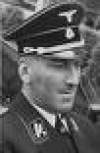
In the first place, I should like to state to the Tribunal that I am fully aware of the serious character of the charges against me. I know the hatred of the world is directed against me, and that I particularly, since Himmler, Muller and Pohl are no longer alive, must here alone give an account to the world and the Tribunal. I realize that I shall have to tell the truth in this court -room in order to enable the Tribunal and the world to recognize fully and understand what has been going on in Germany during this war, and to judge it with fairness. In 1943 - that is to say, two years before the unhappy end of this war, I was appointed to a certain office. I will give details about that later on. First and foremost, I would like to state that I assume responsibility for every wrong that was committed within the scope of this office since I was appointed Chief of the R.S.H.A. and as far as it happened under my actual control, which means that I knew about it or had to know about it. [For Kaltenbrunner's full testimony, Click here.]
1946 Nuremberg Tribunal: From the Press coverage of Kaltenbrunner's first day of testimony in The Times: "His fellow prisoners in the dock began to look embarrassed . . . . Goering absented himself in the afternoon with a slight cold." (Tusa)
1951 Truman relieves MacArthur of duties in Korea:
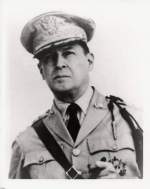
In perhaps the most famous civilian-military confrontation in the history of the United States, President Harry S. Truman relieves General Douglas MacArthur of command of the U.S. forces in Korea. The firing of MacArthur set off a brief uproar among the American public, but Truman remained committed to keeping the conflict in Korea a "limited war."
Problems with the flamboyant and egotistical General MacArthur had been brewing for months. In the early days of the war in Korea (which began in June 1950), the general had devised some brilliant strategies and military maneuvers that helped save South Korea from falling to the invading forces of communist North Korea. As U.S. and United Nations forces turned the tide of battle in Korea, MacArthur argued for a policy of pushing into North Korea to completely defeat the communist forces. Truman went along with this plan, but worried that the communist government of the People's Republic of China might take the invasion as a hostile act and intervene in the conflict. In October 1950, MacArthur met with Truman and assured him that the chances of a Chinese intervention were slim. Then, in November and December 1950, hundreds of thousands of Chinese troops crossed into North Korea and flung themselves against the American lines, driving the U.S. troops back into South Korea. MacArthur then asked for permission to bomb communist China and use Nationalist Chinese forces from Taiwan against the People's Republic of China. Truman flatly refused these requests and a very public argument began to develop between the two men.
In April 1951, President Truman fired MacArthur and replaced him with Gen. Matthew Ridgeway. On April 11, Truman addressed the nation and explained his actions. He began by defending his overall policy in Korea, declaring, "It is right for us to be in Korea." He excoriated the "communists in the Kremlin [who] are engaged in a monstrous conspiracy to stamp out freedom all over the world." Nevertheless, he explained, it "would be wrong—tragically wrong—for us to take the initiative in extending the war... Our aim is to avoid the spread of the conflict." The president continued, "I believe that we must try to limit the war to Korea for these vital reasons: To make sure that the precious lives of our fighting men are not wasted; to see that the security of our country and the free world is not needlessly jeopardized; and to prevent a third world war." General MacArthur had been fired "so that there would be no doubt or confusion as to the real purpose and aim of our policy."
MacArthur returned to the United States to a hero's welcome. Parades were held in his honor, and he was asked to speak before Congress (where he gave his famous "Old soldiers never die, they just fade away" speech). Public opinion was strongly against Truman's actions, but the president stuck to his decision without regret or apology. Eventually, MacArthur did "just fade away," and the American people began to understand that his policies and recommendations might have led to a massively expanded war in Asia. Though the concept of a "limited war," as opposed to the traditional American policy of unconditional victory, was new and initially unsettling to many Americans, the idea came to define the U.S. Cold War military strategy. (History.com)
1961 The trial of Adolf Eichmann begins in Jerusalem:

He was indicted on 15 criminal charges, including charges of crimes against humanity, crimes against the Jewish people and membership of an outlawed organization. As in Israeli criminal procedure, his trial was presided over by three judges. Gideon Hausner, the Israeli attorney general, personally acted as chief prosecutor. The trial caused huge international controversy as well as an international sensation. The Israeli government allowed news programs all over the world to broadcast the trial live with few restrictions. Television viewers saw a nondescript man sitting in a bulletproof glass booth while witnesses, including many Holocaust survivors, testified against him and his role in transporting victims to the extermination camps. During the whole trial, Eichmann insisted that he was only following orders. [For further details, Click here.]
2000 Holocaust: David Irving opens his High Court libel action in a British court against American Professor Deborah Lipstadt of Emory University and her British publisher, Penguin Books, Ltd. in 1996. Irving charged that Lipstadt committed libel when she characterized him as a Holocaust denier who tended to "misstate, misquote, falsify statistics and falsely attribute conclusions to reliable sources" in her book, Denying the Holocaust: The Growing Assault on Truth and Memory . . . . Comically compromising his attempt to dismiss Lipstadt's claims that he admired Hitler, Irving, in a moment of weariness during his closing statement, addressed the [judge] as "Mein Fuehrer." [See: Is It Revisionism or Denial, and Why Does it Matter?]
Edited by Levi Bookin (Copy editor) Click to join 3rdReichStudies Please note that the list-owner and the moderator are not responsible for, and do not necessarily approve of, the random ads placed on our pages by our web server. They are the unfortunate price one pays for a 'free' website. FAIR USE NOTICE: This site may contain copyrighted material the use of which has not always been specifically authorized by the copyright owner. We are making such material available in our efforts to advance understanding of historical, political, human rights, economic, democracy, scientific, environmental, and social justice issues, etc. We believe this constitutes a 'fair use' of any such copyrighted material as provided for in section 107 of the US Copyright Law. In accordance with Title 17 U.S.C. Section 107, the material on this site is distributed without profit to those who have expressed a prior interest in receiving the included information for research and educational purposes. If you wish to use copyrighted material from this site for purposes of your own that go beyond 'fair use', you must obtain permission from the copyright owner.
levi.bookin@gmail.com







